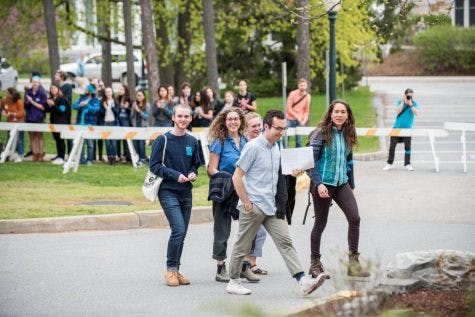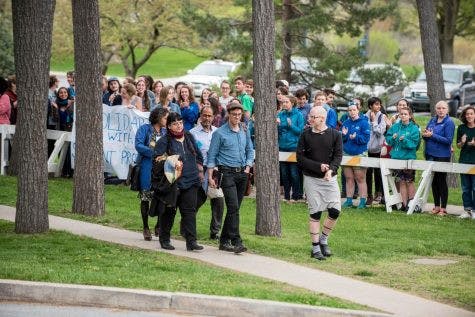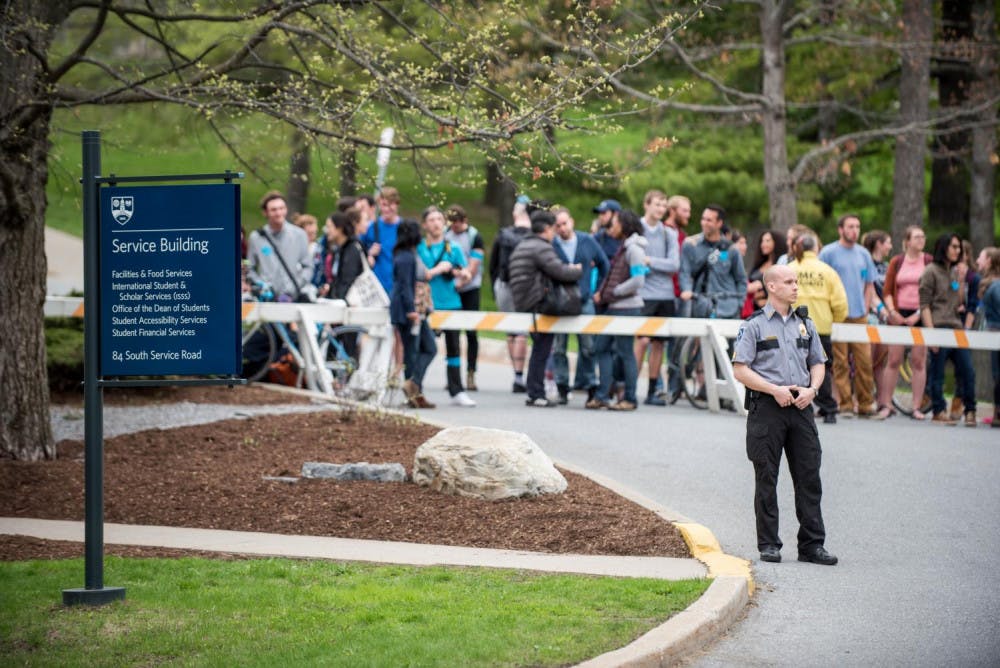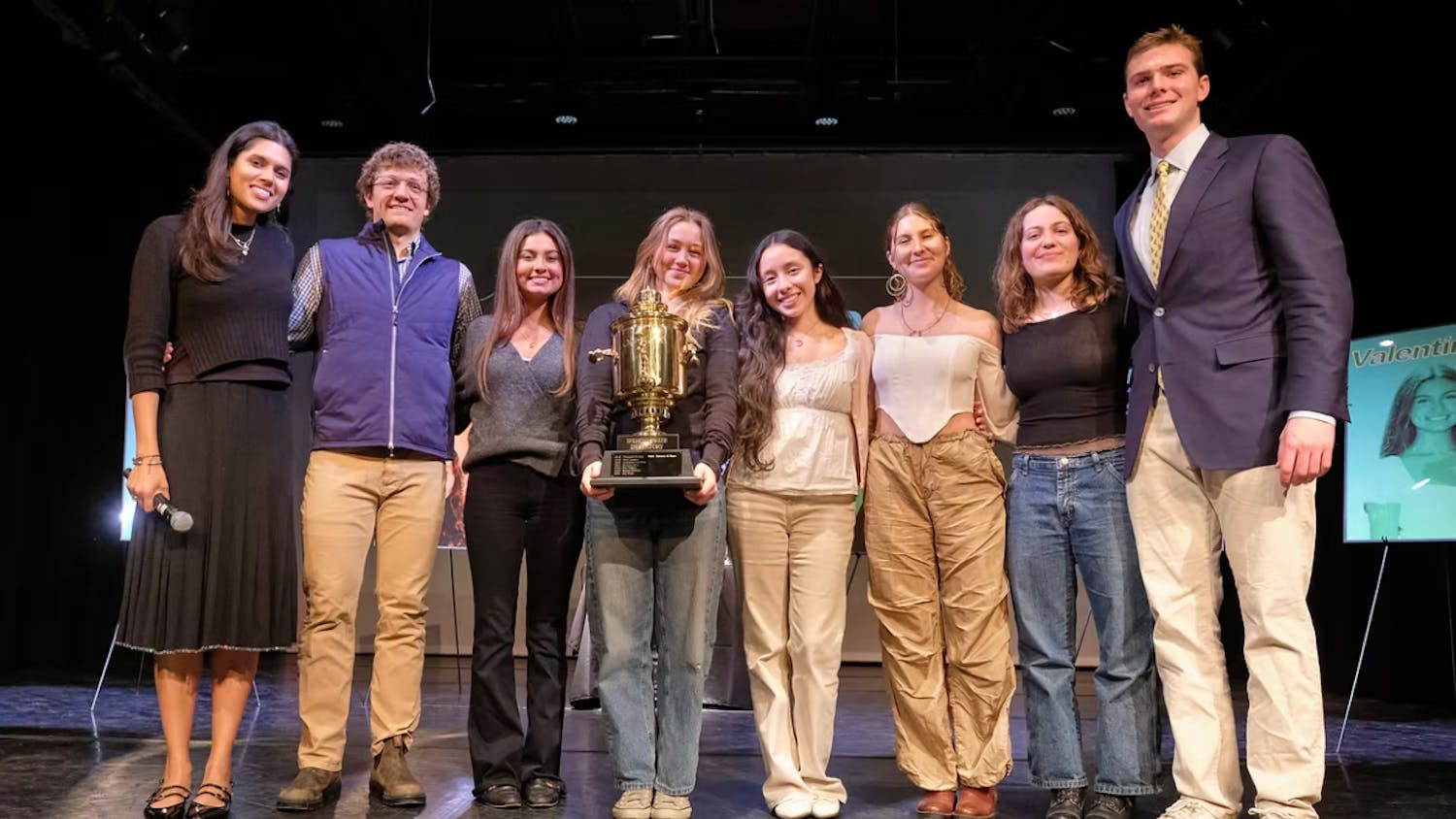Two years ago, students protested and shut down a lecture by Charles Murray, a controversial sociologist whose attempts to link race with intelligence have led many to consider his work racist. The day after the March 2 protest, President Laurie Patton sent an all-school email expressing her disappointment.
“We will be responding in the very near future to the clear violations of Middlebury College policy that occurred inside and outside Wilson Hall,” Patton wrote. Specifically, the protesters violated section C.4 of the Student Handbook, which prohibits “disruptive behavior at community events or on campus.”
Despite this email, few of the students who protested anticipated the extent to which the college would pursue sanctions against them. The investigation and judicial process for students who were identified as having attended the event lasted until late May. The college punished 74 students with sanctions ranging from probation, which functions as a warning and a “first strike,” to official college discipline, which goes on a student’s permanent record.
During the first round of sanctions in March, 48 students were called in to meet with judicial affairs officers and put on probation for the remainder of the semester. The remaining 26 students, who were originally charged with official college discipline, did not receive notice of their punishment until early April.
Many decided to appeal the college’s decision to sanction them with official college discipline, which triggered a longer and more complicated judicial process that culminated in hearings before the college’s Community Judicial Board. Nineteen of those 26 students faced official college discipline for the same charge: remaining in Wilson Hall to protest after the event had been moved to a live stream. These students requested a group hearing to appeal the finding, and were granted permission to go through the process together. Ultimately, all 19 had their punishment reduced and were put on probation for the remainder of the spring and, for those not about to graduate, for two additional semesters.
The students involved, who are now more willing to discuss the judicial process than they were two years ago, recently agreed to speak about their experiences. They reported that going through the judicial process after the protest negatively impacted their mental health, made it more challenging to focus on their studies and permanently changed the way they view the college and administration.
The Impact
Since the students who faced more serious sanctions did not receive notice until the second round of disciplinary action began in early April, many of them spent March on edge.
“The sense of waiting for punishment was hard,” said Matea Mills-Andruk ’18.5. “I felt really overwhelmed. I had friends who didn’t go to the dining hall for a few weeks or a month after the protest and they mostly stayed in their rooms. They missed a lot of class and just became very isolated and alone.”
The waiting was made more stressful for some by the fact that the college used video footage of the protest, often submitted by students, to identify the protesters. Not everybody who protested was identified and called in. This made the process feel confusing and opaque.

Students cheered on their peers as they walked to the hearings at the Service Building.
Associate Sociology Professor Linus Owens, one of the faculty members chosen by students to attend the hearing, remembered that the length of the judicial process was hard for the students, some of whom came to him for support.
“I think that dragging it out, it really sort of had a terroristic effect on students,” Owens said. “Students were waiting to get called and then not everyone got called and then not everyone got punished the same way. It felt arbitrary and really problematic.”
Associate Professor of Education Studies Tara Affolter, who helped students organize the protest, agreed that the lack of transparency during the judicial process was stressful for many of her students.
“That sort of thing had a very chilling and detrimental effect on students. They weren’t present for their learning, they weren’t able to engage the ideas or grow from the experience,” she said.
Owens recalls feeling as though the college was responding to national pressures when deciding next steps, a feeling shared by many of the student protesters.
“I think the punishment was driven less by actual college rules than by the need to satisfy national audiences,” Owens said. “There was a huge concern that this was going to cost Middlebury.”
Once the extended judicial process began, many students found it incredibly stressful. One student who was part of the group hearing, who asked to be referred to as Bailey, said that their mental health suffered while the process was underway.
[pullquote speaker="Bailey" photo="" align="center" background="on" border="all" shadow="on"]We were full-time students and we were full-time protesters at that point. I didn’t have any time to even cope with where my mental health was at.[/pullquote]
“I didn’t have any time, was the biggest thing. We were full-time students and we were full-time protesters at that point,” they said. “I didn’t have any time to even cope with where my mental health was at.”
Students were occupied drafting an opening statement, communicating with administrators, supporting one another and lining up character witnesses for the hearing.
The pressures of the judicial process also impacted students’ ability to go about the rest of their lives. Mills-Andruk had to quit one of her jobs during that semester. Sarah Karerat ’18 said she found it difficult to focus on her academics.
“My ability to participate in classes went down,” Karerat said. “It’s exhausting to be that anxious all the time. It definitely took a toll on my mental health, and it took a toll on my relationships.”
According to Sarah Ray, the director of media relations at the college, the judicial process took so long because of the large amount of photo and video evidence that the college needed to review.
“We understood that the student judicial process was a stressful one for many students, particularly since it came at the end of the semester,” she said. “Students were offered expedited paths through the process, which some accepted.”
But accepting an expedited path through the process would have meant not challenging the finding of official college discipline, which many students felt was not a reasonable option.
[pullquote speaker="Sarah Karerat ’18" photo="" align="center" background="on" border="all" shadow="on"]I was 20 years old and I didn’t know what could happen and I was scared.[/pullquote]
“Being low-income and needing to think about graduate school and scholarships and not having access to graduate school in the way that other folks do, it felt like this could really mess with my future,” Karerat said. “I was 20 years old and I didn’t know what could happen and I was scared.”
On top of stress about potential sanctions, students wrestled with a deeper sense of loss.
“The most jarring thing that happened that semester was I felt like I lost home, and that was so horrible,” Karerat said, explaining that during her time in college, Middlebury felt more like home to her than anywhere else. “I didn’t trust Middlebury anymore. I didn’t trust the space. I didn’t know if it was mine. To have that relationship change was really, really difficult.”
Bailey recalled a similar feeling of rejection by the wider college community.
“It really felt like the institution itself, that Laurie Patton, that anyone who was at all involved in the upper levels of the institution was saying, ‘These aren’t Middlebury students, these are thugs, these are radicals and they’re not part of our community,’” they said. “There were students on trial who were literally the heads of incredibly important organizations on campus, and for them to experience this disavowal from the college, and for the college to be like, ‘You’re not part of us anymore,’ it really felt like we were voted off the island. To feel like your home didn’t want you, that was one of the worst feelings.”

Faculty members supporting student protesters arrived at the Service Building in May 2017.
The Hearing
Students who went through the hearing recalled that it was also a taxing and emotional experience. Students arrived at the Service Building at 6 p.m. on May 4 along with faculty members, such as Owens, who they chose to attend the hearing for emotional support. They found the entrance lined with police barricades and security with a huge crowd of people gathered to cheer them on as they entered the building.
The hearing lasted around four hours and as part of the process, each student was allowed a character witness to speak on their behalf. Many faculty members served in this role, including Associate Professor of Anthropology Michael Sheridan. Sheridan bought chocolates for the students facing sanctions because he said he figured that they might feel “encircled by dementors.”
“After sitting down in front of the board, I made a point to remain facing directly ahead while holding out the packages of chocolate backwards for someone to take and pass on,” he said. “That was my way to both support the students and express my frustration at the very, very limited ways that our community was communicating with one another.”
According to Karerat, the part of the hearing where the character witnesses read their statements was the most emotional for her.
“There was a lot of crying. A lot of the character witnesses cried and a lot of us cried in response,” she said. “Listening to other people’s character witnesses, I remember thinking, ‘Wow, this is the most resilient, powerful group of people I know and I am so sad they had to go through this.’”
Mills-Andruk also remembers the emotional impact of the character witness statements.
[pullquote speaker="Sarah Karerat ’18" photo="" align="center" background="on" border="all" shadow="on"]Listening to other people’s character witnesses, I remember thinking, ‘Wow, this is the most resilient, powerful group of people I know and I am so sad they had to go through this.’[/pullquote]
“It was incredible to hear what everyone had done and everyone’s interests and lives and families and where they’re from,” she said. “It was like a song to all of us about our own humanness.”
For many, the trial cemented relationships that had been forming throughout the process.
“There was a strong community that came out of this,” Karerat said. “It was a strange but lovely silver lining. I think some of the strongest bonds come out of trauma or crisis, and we were all going through the same thing. Especially with all the ruptures over this in the wider community, it was really nice to have a group of people I didn’t have to explain myself to.”
The Aftermath
The judicial process culminated a few weeks before the end of the semester. Some of the 19 students who went through the group trial graduated, while others returned the following fall and continued serving their probation.
[pullquote speaker="Associate Professor of Education Studies Tara Affolter" photo="" align="center" background="on" border="all" shadow="on"]I think it’s going to continue to limit and create fear around student protests and protests in general.[/pullquote]
Even though probation does not go on a student’s record, many students reported it impacted their lives on campus. According to Bailey, their probation made any kind of activism, like walkouts and rallies, feel like too big of a risk to take.
“I know for me there were events and things going on that I didn’t feel comfortable going to because I was worried about how they could progress. I really have no trust in the administration or in the college anymore and so I didn’t want to take any risks,” they said. “It was a very effective silencing of any student that had it.”
Affolter also worries about how the college’s handling of the judicial process will impact future student organizing efforts.
“I think it’s going to continue to limit and create fear around student protests and protests in general,” she said. “I don’t think it’s pedagogically or developmentally appropriate to use fear and vague intimidation as a way to shore things up. That’s not really the best way to get the community that you want.”
Despite everything that happened afterward, Mills-Andruk said that she does not regret protesting.
“If we had not resisted, the message to the rest of the student body, the staff and faculty of the college, alumni, community members in the town of Middlebury, or anyone watching the news, would be of an apathetic campus who did not care about its community,” she said. “The protest was an act of kindness, care, defense, love, desperation and survival.”
All of the students who spoke to The Campus about the judicial process reported wrestling with a complicated or outright negative view of the college in light of their experience.
[pullquote speaker="Sarah Koch ’18.5" photo="" align="center" background="on" border="all" shadow="on"]It felt so clear to me that Middlebury was concerned about their reputation above everything else, to the extent that they couldn’t take any sort of institutional action to care for students.[/pullquote]
“It felt so obvious where loyalties lay and it was not with marginalized students during that process,” said Sarah Koch ’18.5. “It felt so clear to me that Middlebury was concerned about their reputation above everything else, to the extent that they couldn’t take any sort of institutional action to care for students.”
According to Bailey, the aftermath of the protest did permanent damage to their view of the college and the administration.
“It really was like this giant black rain cloud over my time at Middlebury,” they said. “Before this event I had always been like, ‘I love Middlebury, I’m so happy I went here.’ And I still love my life, but I give absolutely no credit to the institution.”
Karerat also reported a shift in her feelings toward the college and the administration as a result of this process, although she felt that she was able to rebuild some of those relationships in her final year on campus.
She added that, despite everything, she hopes that students will continue to organize and advocate to make Middlebury a better place.
“Keep the radical organizing activist energy alive,” she said. “Organizing spaces are great spaces for community and friendship, and they are the best spaces to work to make change, and Middlebury needs to change. It is always going to have room to grow.”
Two Years After Murray, Students Reflect on the Disciplinary Process

MICHAEL O'HARA
MICHAEL O'HARA
Comments



